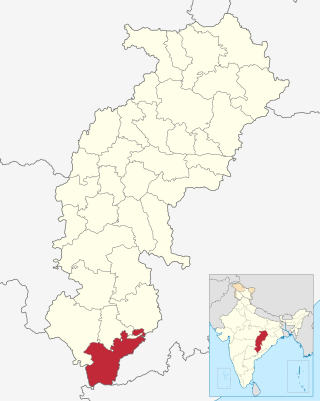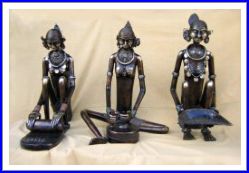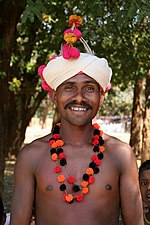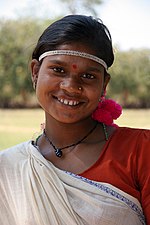
Sexual abstinence or sexual restraint is the practice of refraining from some or all aspects of sexual activity for medical, psychological, legal, social, philosophical, moral, religious or other reasons. Sexual abstinence is distinct from asexuality, which is a sexual orientation where people feel little or no sexual attraction. Celibacy is sexual abstinence generally motivated by factors such as an individual's personal or religious beliefs. Sexual abstinence before marriage is required in some societies by social norms, or by law in some countries. It is a part of chastity.

Chhattisgarh is a landlocked state in Central India. It is the ninth largest state by area, and with a population of roughly 30 million, the seventeenth most populous. It borders seven states – Uttar Pradesh to the north, Madhya Pradesh to the northwest, Maharashtra to the southwest, Jharkhand to the northeast, Odisha to the east, Andhra Pradesh and Telangana to the south. Formerly a part of Madhya Pradesh, it was granted statehood on 1 November 2000 with Raipur as the designated state capital.

Virginity is the state of a person who has never engaged in sexual intercourse. The term virgin originally only referred to sexually inexperienced women, but has evolved to encompass a range of definitions, as found in traditional, modern and ethical concepts. Heterosexual individuals may or may not consider loss of virginity to occur only through penile-vaginal penetration, while people of other sexual orientations often include oral sex, anal sex, or manual sex in their definitions of losing one's virginity.

Premarital sex is sexual activity which is practiced by people before they are married. Premarital sex is considered a sin by a number of religions and also considered a moral issue which is taboo in many cultures. Since the Sexual Revolution of the 1960s, it has become accepted by certain liberal movements, especially in Western countries. A 2014 Pew study on global morality found that premarital sex was considered particularly unacceptable in "Muslim Majority Countries", such as Malaysia, Jordan and Pakistan, each having over 90% disapproval, while people in Western European countries were the most accepting, with Spain, Germany, and France expressing less than 10% disapproval.

The Gondi (Gōṇḍī) or Gond people, who refer to themselves as "Koitur", are an ethnolinguistic group in India. Their native language, Gondi, belongs to the Dravidian family. They are spread over the states of Madhya Pradesh, Maharashtra, Chhattisgarh, Uttar Pradesh, Telangana, Andhra Pradesh, Bihar, and Odisha. They are listed as a Scheduled Tribe for the purpose of India's system of reservation.
Bundling, or tarrying, is the traditional practice of wrapping a couple together in a bed sometimes with a board between the two of them, usually as a part of courting behavior. The tradition is thought to have originated either in the Netherlands or in the British Isles and later became common in colonial United States, especially in Pennsylvania Dutch Country. Bundling is associated with the Amish as a form of courtship.

Bastar is a district in the state of Chhattisgarh in Central India. Jagdalpur is the district headquarters. Bastar is bounded on the northwest by Narayanpur District, on the north by Kondagaon district, on the east by Nabarangpur and Koraput Districts of Odisha State, on the south and southwest by Dantewada and Sukma. The district possesses a unique blend of tribal and Odia culture.
Casual sex is sexual activity that takes place outside a romantic relationship and implies an absence of commitment, emotional attachment, or familiarity between sexual partners. Examples are sexual activity while casually dating, one-night stands, prostitution or swinging and friends with benefits relationships.

Uttar Bastar Kanker District is located in the southern region of the state of Chhattisgarh, India within the latitudes 20.6-20.24 and longitudes 80.48-81.48. The total area of the district is 6432 square kilometers. The population is 748,941.

Nand Kumar Sai is an Indian politician. He is former member of the Indian National Congress and also Bharatiya Janata Party. He was elected to the Lok Sabha, 1989–1991 and 1996–1998, from Raigarh when it was in Madhya Pradesh. In 2004 he was elected a member of the 14th Lok Sabha representing Surguja constituency of Chhattisgarh. He was elected a Rajya Sabha MP from Chhattisgarh in 2009 and 2010. He remained an MP until 2016.
Halba are a tribal community found in Chhattisgarh, Maharashtra, Madhya Pradesh and Odisha in India. They speak the Halbi language. They are primarily agricultural community. Halbas are mixed tribes or tribal caste, descended from the unions of Gonds and Hindus. Linguistic evidence also points to the fact that the Halbas are an aboriginal tribe, who have adopted Hinduism and an Indo-European language. They were cultivators and farm servants whose home is the south of the Raipur District and the Kanker and Bastar States; from here small numbers of them have spread to Bhandara, parts of Berar and also into Koraput in Odisha.

Bastar state was a princely state in India during the British Raj. It was founded in the early 14th century by Annamaraja, a brother of the last ruler of the Kakatiya dynasty, Prataparudra II.
The Panika are a Hindu community found in the Indian states of Chhattisgarh, Jharkhand, Madhya Pradesh, Odisha and Uttar Pradesh. Traditionally they are weaver. They are also known as Panka and Panikar.

Sukma district is the southernmost district in the Indian state of Chhattisgarh. It is located in the Bastar region, known for its tribal culture. Sukma district borders with Odisha, Telangana and Andhra Pradesh.

Abujmarh is a hilly forest area, spread over 4,000 square kilometres (1,500 sq mi) in Chhattisgarh, covering Narayanpur district, Bijapur district and Dantewada district. It is home to indigenous tribes of India, including Gond, Muria, Abuj Maria, and Halbaas. It was only in 2009 that the Government of Chhattisgarh lifted the restriction on the entry of common people in the area imposed in the early 1980s. Geographically isolated and largely inaccessible, the area continues to show no physical presence of the civil administration, and is also known as "liberated-zone" as it is an alleged hub of Naxalite-Maoist insurgency, the banned Communist Party of India (Maoist) and its military wing, People's Liberation Guerilla Army (PLGA), who run a parallel government in the area.
Hookup culture is one that accepts and encourages casual sex encounters, including one-night stands and other related activity, without necessarily including emotional intimacy, bonding or a committed relationship. It is generally associated with Western late adolescent sexuality and, in particular, United States college culture. The term hookup has an ambiguous definition because it can indicate kissing or any form of physical sexual activity between sexual partners. The term has been widely used in the U.S. since at least 2000. It has also been called nonrelationship sex, or sex without dating.
Krantikari Adivasi Mahila Sangathan is a banned women's organisation based in India. The Krantikari Adivasi Mahila Sangathan (KAMS) is a successor of the Adivasi Mahila Sanghathana (AMS). The foundation of the AMS was laid by the Maoists in 1986.

Fornication is generally consensual sexual intercourse between two people not married to each other. When one or more of the partners having consensual sexual intercourse is married to another person, it is called adultery. John Calvin viewed adultery to be any sexual act that is outside the divine model for sexual intercourse, which includes fornication.

Bastar Wooden Crafts are traditional Indian wooden crafts that are manufactured in the Bastar district of Chhattisgarh state, India. The wood-crafting work has been protected under the Geographical indication (GI) of the Agreement on Trade-Related Aspects of Intellectual Property Rights (TRIPS) agreement. It is listed at item 84 as "Bastar Wooden Craft" of the GI Act 1999 of the Government of India with registration confirmed by the Controller General of Patents Designs and Trademarks.
The Bastar Rebellion, also known as the bhumkal movement was an Adivasi rebellion in 1910 against the British Raj in the princely state of Bastar in central India. It was primarily led by Gunda Dhur, a tribal leader, as well as by a diwan and cousin of the king, Lal Karendra Singh. The tribals mobilized, which led to the entire state rising in revolt against the British colonial government, overwhelming the small 250-strong police force in the state, and was marked by widespread rioting, looting and arson. By the end of February, however, additional troops from neighbouring Jeypore and Bengal had quelled the revolt and arrested the leaders.
















